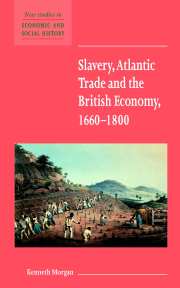Book contents
- Frontmatter
- Contents
- List of maps
- List of tables
- Acknowledgements
- Introduction
- 1 The context
- 2 The debates
- 3 The profits of the slave trade
- 4 Slavery, Atlantic trade and capital accumulation
- 5 British exports and transatlantic markets
- 6 Business institutions and the British economy
- 7 Atlantic trade and British ports
- Conclusion
- Bibliography
- Index
- Cambridge Cultural Social Studies
1 - The context
Published online by Cambridge University Press: 05 June 2012
- Frontmatter
- Contents
- List of maps
- List of tables
- Acknowledgements
- Introduction
- 1 The context
- 2 The debates
- 3 The profits of the slave trade
- 4 Slavery, Atlantic trade and capital accumulation
- 5 British exports and transatlantic markets
- 6 Business institutions and the British economy
- 7 Atlantic trade and British ports
- Conclusion
- Bibliography
- Index
- Cambridge Cultural Social Studies
Summary
The starting point for examining connections between slavery, Atlantic trade and the British economy in the period 1660–1800 lies in the broad reasons for colonial settlement by the English in the seventeenth century and the emergence of slavery as the principal form of large-scale labour organisation in the Atlantic colonies. English curiosity about the New World stimulated voyages of exploration in the sixteenth century. Defeat of the Spanish Armada in 1588 paved the way for English colonisation of the Americas by destroying Spanish naval dominance. English merchants benefiting from the price rises of the sixteenth century formed joint-stock trading companies in the hope of tapping wealth from overseas, notably from the Atlantic world. A greater degree of social and geographical mobility in England, lack of good economic opportunities at home, the lure of new territories as a magnet and serious religious divisions, mainly within Protestantism, provided motives for English people to migrate to colonies in the Stuart era. Settlers from the mother country went to North America and the Caribbean in their thousands as colonisation underwent decades of experimentation. By the end of the seventeenth century around 350,000 English people had crossed the Atlantic.
Before the English Civil War, the main English colonial settlements were in Barbados, the Leeward Islands of Antigua, Nevis and St Christopher, Virginia, Maryland and Massachusetts Bay.
- Type
- Chapter
- Information
- Publisher: Cambridge University PressPrint publication year: 2001



